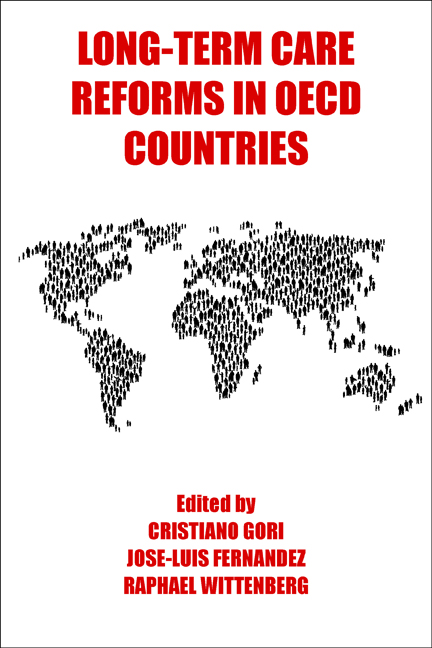Twelve - Multilevel governance and its effects on long-term care support
Published online by Cambridge University Press: 19 August 2022
Summary
Introduction
Since the 1980s, in many Western countries new universal oriented long-term care (LTC) policies have been established. Up to then, prevalent, often residual, LTC policies were generally administered at local or regional levels. The introduction of more universal LTC policies resulted in a greater involvement of central levels of government, which was followed by the establishment of complex territorial interrelationships of LTC policies (see, for example, Vabo, 2010a). As a consequence, the (changing) interplay of local, regional and central political levels became crucial for policy development, implementation and its effects (Strohmeier Navarro Smith, 2010; Vabo, 2010a; Burau and Vabo, 2011; Ranci and Pavolini, 2013).
States can be seen as latecomers in an arena where a wide range of social actors, such as the family or civil society, had been traditionally involved in the administration, provision and financing of LTC support (Burau et al, 2007; Vabo, 2010a, 2010b). Burau and colleagues (2007) state that the issue of LTC does not easily fit into the public nature of policies, because home care stretches across sectors: private (family) and public (the state, markets and civil society). In addition to territorial restructuring, the reorganisation of the mode of interplay between different sectors was selected as one strategy to adapt public LTC support faced with increasing needs for services and decreasing informal, family resources. For example, policy schemes – such as cash allowances – were introduced to maintain informal, family care. In addition, a trend to marketise care provision can be found, characterised by the introduction of market principles and closer forms of cooperation between the state and private not-for-profit and for-profit providers (Burau et al, 2007; Ungerson and Yeandle, 2007; Strohmeier Navarra Smith, 2010; Theobald, 2012).
The involvement of wider social actors and the newly-defined forms of cooperation between them and the state have an impact on the logic of a policy field previously dominated by the logic of the family and civil society. Research findings have revealed an increasing influence of the logic of the market, accompanied by extended state regulation and control of service providers (Bode et al, 2011; Theobald, 2012). As a consequence, a co-existence of different logics of governance is evident (Burau et al, 2007; Dingeldey and Rothgang, 2010; Osborne, 2010).
- Type
- Chapter
- Information
- Long-Term Care Reforms in OECD CountriesSuccesses and failures, pp. 271 - 292Publisher: Bristol University PressPrint publication year: 2015
- 2
- Cited by

